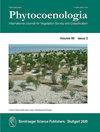Phytocoenologia : the leading journal with a focus on vegetation classification
IF 0.9
4区 生物学
Q4 ECOLOGY
引用次数: 1
Abstract
This annual Editorial of 2017 summarizes the developments of the journal Phytocoenologia in the two years following its re-launch in 2015. Both the Editorial Team and the topics and regions of publications are very diverse. Starting with 2015, Impact Factors and CiteScores profoundly improved compared to the previous years, which, together with some other measures, has rendered Phytocoenologia an increasingly attractive publication venue. Narrowing the scope of Phytocoenologia explicitly down to “vegetation survey and classification” was arguably one of the cornerstones of recent success. The bibliometric analyses have also allowed us to demonstrate that both in absolute numbers and with regard to the proportion of such papers, Phytocoenologia can now be considered the leading journal in the field of vegetation classification worldwide. The citation network of Phytocoenologia includes a wide array of journals, although many remain to be covered in the Web of Science, to the bibliometric disadvantage of Phytocoenologia. We shortly present the four Editors’ Choice articles of 2016 and a selection of some other outstanding contributions of that volume. The Editors’ Award 2016 goes to Rui B. Elias and colleagues for their combination of vegetation classification and distribution modelling to derive a map of the natural vegetation of the Azores. In conclusion, the Editors aim to provide a service to vegetation ecologists worldwide by maintaining and further improving the qualities of Phytocoenologia.植物群落学:主要关注植被分类的期刊
本2017年度社论总结了《植物群落学》杂志自2015年重新启动以来两年来的发展。无论是编辑团队还是出版物的主题和地区都非常多样化。从2015年开始,影响因子和CiteScores与前几年相比有了很大的改善,这与其他一些措施一起,使植物群落学成为一个越来越有吸引力的出版场所。将植物群落学的范围明确地缩小到“植被调查和分类”可以说是最近成功的基石之一。文献计量学分析也使我们能够证明,无论是在绝对数量上还是在这类论文的比例上,《植物群落学》现在都可以被认为是世界范围内植被分类领域的领先期刊。植物群落学的引文网络包括广泛的期刊,尽管许多期刊仍未被科学网络覆盖,这对植物群落学的文献计量不利。我们将简要介绍2016年的四篇编辑之选文章,以及该卷中其他一些杰出贡献的精选。2016年编辑奖授予Rui B. Elias及其同事,他们将植被分类和分布建模相结合,得出了亚速尔群岛的自然植被图。总之,编者的目标是通过保持和进一步提高植物群落的质量,为全世界的植被生态学家提供服务。
本文章由计算机程序翻译,如有差异,请以英文原文为准。
求助全文
约1分钟内获得全文
求助全文
来源期刊

Phytocoenologia
生物-植物科学
CiteScore
2.60
自引率
0.00%
发文量
7
审稿时长
>12 weeks
期刊介绍:
Phytocoenologia is an international, peer-reviewed journal of plant community ecology. It is devoted to vegetation survey and classification at any organizational and spatial scale and without restriction to certain methodological approaches. The journal publishes original papers that develop new vegetation typologies as well as applied studies that use such typologies, for example, in vegetation mapping, ecosystem modelling, nature conservation, land use management or monitoring. Particularly encouraged are methodological studies that design and compare tools for vegetation classification and mapping, such as algorithms, databases and nomenclatural principles. Papers dealing with conceptual and theoretical bases of vegetation survey and classification are also welcome. While large-scale studies are preferred, regional studies will be considered when filling important knowledge gaps or presenting new methods.
 求助内容:
求助内容: 应助结果提醒方式:
应助结果提醒方式:


